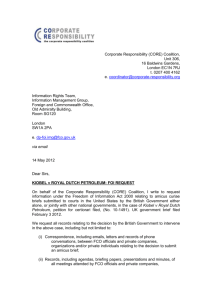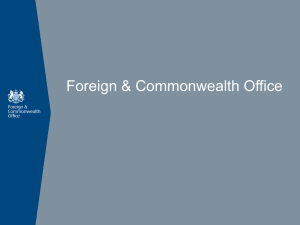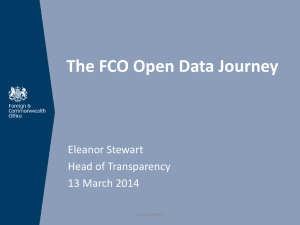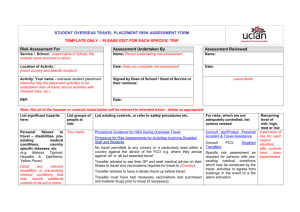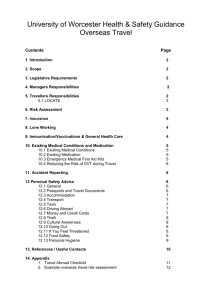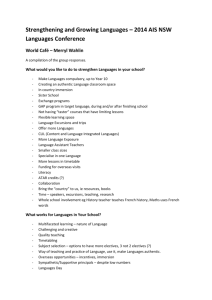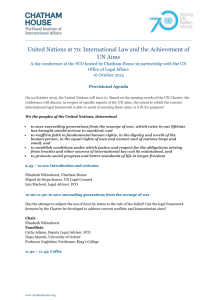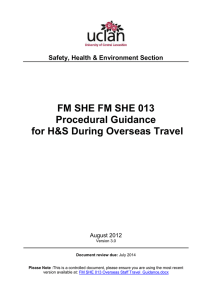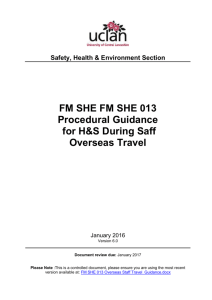Advice to Students on Completing the Overseas Travel Risk
advertisement
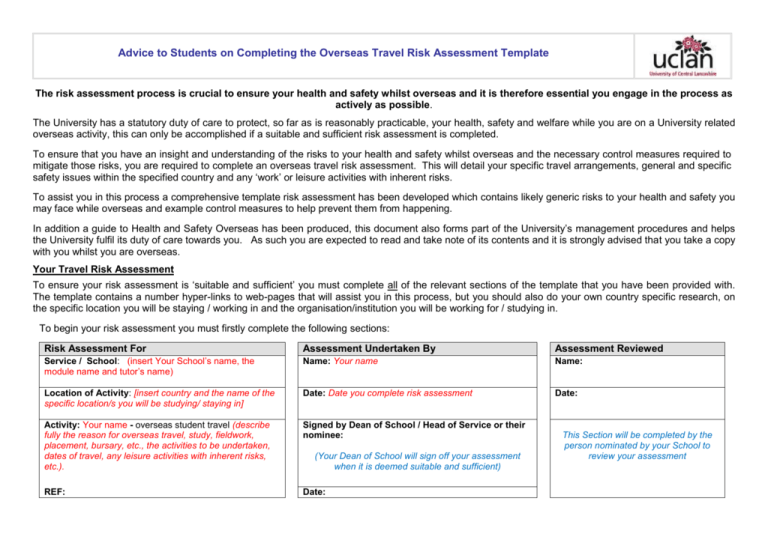
Advice to Students on Completing the Overseas Travel Risk Assessment Template The risk assessment process is crucial to ensure your health and safety whilst overseas and it is therefore essential you engage in the process as actively as possible. The University has a statutory duty of care to protect, so far as is reasonably practicable, your health, safety and welfare while you are on a University related overseas activity, this can only be accomplished if a suitable and sufficient risk assessment is completed. To ensure that you have an insight and understanding of the risks to your health and safety whilst overseas and the necessary control measures required to mitigate those risks, you are required to complete an overseas travel risk assessment. This will detail your specific travel arrangements, general and specific safety issues within the specified country and any ‘work’ or leisure activities with inherent risks. To assist you in this process a comprehensive template risk assessment has been developed which contains likely generic risks to your health and safety you may face while overseas and example control measures to help prevent them from happening. In addition a guide to Health and Safety Overseas has been produced, this document also forms part of the University’s management procedures and helps the University fulfil its duty of care towards you. As such you are expected to read and take note of its contents and it is strongly advised that you take a copy with you whilst you are overseas. Your Travel Risk Assessment To ensure your risk assessment is ‘suitable and sufficient’ you must complete all of the relevant sections of the template that you have been provided with. The template contains a number hyper-links to web-pages that will assist you in this process, but you should also do your own country specific research, on the specific location you will be staying / working in and the organisation/institution you will be working for / studying in. To begin your risk assessment you must firstly complete the following sections: Risk Assessment For Assessment Undertaken By Assessment Reviewed Service / School: (insert Your School’s name, the module name and tutor’s name) Name: Your name Name: Location of Activity: [insert country and the name of the specific location/s you will be studying/ staying in] Date: Date you complete risk assessment Date: Activity: Your name - overseas student travel (describe fully the reason for overseas travel, study, fieldwork, placement, bursary, etc., the activities to be undertaken, dates of travel, any leisure activities with inherent risks, etc.). Signed by Dean of School / Head of Service or their nominee: REF: Date: (Your Dean of School will sign off your assessment when it is deemed suitable and sufficient) This Section will be completed by the person nominated by your School to review your assessment In the next sections of the risk assessment likely risks to your health and safety and example control measures have been inserted to aid you. You must ‘customise’ the template to your particular travel destination by consulting the specific country/area travel safety advice given by the UK Foreign & Commonwealth Office: Foreign travel advice page - https://www.gov.uk/foreign-travel-advice These links will take you to this FCO webpage: China Insert name of country Or scroll down to name of country being visited You must now open each link, read through and take note of all the travel safety advice given by the FCO for the country you will be visiting, this will need to be entered into your risk assessment. Please note: You are not permitted to travel to any country or a specific area within a country against the advice of the FCO, e.g. where they advise against ‘all’ or ‘all but essential travel’. If you go to a country that has no travel restrictions, but they subsequently change and the FCO then advises against travel’ you will be required to return to the University as soon as possible. In addition to FCO travel safety advice you are also required to check the travel safety advice given by red24 a leading global security company whose services are part of the University’s overseas travel accident and insurance policy. The specific information provided by red24 is far more comprehensive and detailed than that provided by the FCO which may prove vital particularly with travel to higher risk destinations. Red24 will also email travellers a security briefing tailored to your travel itinerary when travelling to a high-risk region, this covers the risks, preventative measures and important contacts you require to help you remain safe while travelling abroad. Please note: The services of red24 must not be used for the booking of flights, accommodation, etc. To access red24 go to https://www.red24.com/affiliate/aonprotect/ – 4 digit ‘ACE access code’ is 7797 Enter access code 7797 and click Proceed Click Travel assistance website icon Insert name of country and/or insert name of city or or scroll down to name of country being visited scroll down to name of city being visited You must now open each of the 7 links from the icons, read through and take note of all the travel safety advice given by red24 for the country/city you will be visiting, this will again need to be entered into your risk assessment. Red24 also provide an overall risk rating for each country and major capital cities along with a breakdown of risk levels Red24 also provide daily significant incident alerts The next step is to actually start inserting personal information, safety warnings and safety advice from the FCO / red24 into the applicable significant hazard / existing control section. In the ‘Personal ‘fitness’ to travel section of the risk assessment, you should include not only advice from the FCO / red24, NHS Fitfortravel / GP, etc., on any country specific diseases and precautions, but please also declare any relevant disabilities or pre-existing medical conditions that may require additional control measures to be put in place to ensure your health, safety and welfare before or during your overseas travel. Now for other travel safety risks, for example where a general or specific warning is given such as: ‘There is a low threat from terrorism. But you should be aware of the global risk of indiscriminate terrorist attacks which could be in public areas, including those frequented by expatriates and foreign travellers’, you should copy and paste this information into the relevant hazard row in the risk assessment, in this case in the ‘Terrorism, personal security / safety’ section: List significant hazards here: List groups of people at risk: List existing controls, or refer to safety procedures etc. For risks, which are not adequately controlled, list actions needed. Terrorism, personal security / safety Joe Bloggs Procedural Guidance for H&S During Overseas Travel Travellers strongly advised to research the county / specific area which they are visiting e.g. personal safety, areas to avoid, local customs, legislation, etc. FCO Advice 30/07/2013 There is a general threat from terrorism. This reflects both the global risk of indiscriminate terrorist attacks and the possibility of terrorist attacks by groups opposed to the Chinese government. Attacks could be indiscriminate including in places visited by expatriates and foreign travelers. Check FCO website prior to travel to ensure there are no restrictions - no member of staff/student permitted to travel to a country against advice from FCO. Remaining level of risk high, med or low Where general or specific advice is given by the FCO / red24to help protect your health, safety & welfare, for example ‘We advise you to avoid any political rallies, demonstrations or large gatherings which can on occasion become violent’ or ‘You should drink or use only boiled or bottled water and avoid ice in drinks. You should only eat food, which has been thoroughly cooked, and for which basic hygiene precautions have been taken’, you should copy and paste this information into the relevant ‘existing control’ section, for that hazard i.e.: Food Poisoning / Contaminated Water Joe Bloggs Terrorism, personal security / safety Joe Bloggs FCO Advice 30/07/2013 There is a general threat from terrorism. This reflects both the global risk of indiscriminate terrorist attacks and the possibility of terrorist attacks by groups opposed to the Chinese government. Attacks could be indiscriminate including in places visited by expatriates and foreign travelers. FCO Advice 30/08/2013 You should drink or use only boiled or bottled water and avoid ice in drinks. You should only eat food, which has been thoroughly cooked, and for which basic hygiene precautions have been taken’ FCO Advice 30/08/2013 We advise you to avoid any political rallies, demonstrations or large gatherings which can on occasion become violent. Procedural Guidance for H&S During Overseas Travel FCO website prior to travel to ensure there are no restrictions - no member of staff/student permitted to travel to a country against advice from FCO. PLEASE NOTE: If the safety information given by the FCO/red24 is irrelevant to your trip or its associated activities do not include it, for instance if you are travelling to Beijing in China, you do not need to include specific advice for travelling to other provinces in China, or if you are travelling in Summer but there are Winter weather warnings do not includes these. Additionally where a specific hazard is not relevant to your study or leisure activities, for instance you might not be working in an isolated area you MUST delete it from your risk assessment. Ensure your risk assessment is relevant to your travel, to the location you will be going, to the time of year and the activities you will be undertaking while you are overseas. Do not assume the person reviewing your risk assessment knows what you are doing make it clear! In the ‘Specific risks related to the study / leisure activities’ section at the end of the assessment you should try and identify any additional significant hazards related to your work/study activities or the specific location of the institution and any leisure time activities that may have inherent risks (e.g. action sports/activities, trekking, diving, driving, etc., this is essential as there may be insurance restrictions in place). Finally you must then identify suitable control measures to mitigate those risks, i.e.: List significant hazards here: List groups of people at risk: List existing controls, or refer to safety procedures etc. For risks, which are not adequately controlled, list actions needed. Specific risks related to the study / leisure activities Joe Bloggs Activity booked through reputable organisation (Gotoafrica.com)), fully accompanied, all food, accommodation and transport by minibus provided. Full safety induction and medical availability provided. All necessary vaccinations up-to-date and anti-malarial drugs purchased. Walking boots purchased Weekend trekking activity in Masai Mara to be Remaining level of risk high, med or low Medium FCO Travel Safety Advice Road conditions and driving standards are often poor. Drive with windows closed and doors locked. When driving outside cities and in remote areas consider driving in convoy. Avoid driving at night wherever possible. There have been a number of serious accidents involving buses. Vehicles are often poorly maintained and driven at excessive speed. Check the bus operator’s safety standards. Though very cheap to use, matatus (minibuses) are notorious for being poorly maintained, badly driven and uninsured. Once you have entered all relevant information into each section, you must then decide whether there are sufficient existing control measures in place to protect your health, safety and welfare from each hazard identified. If you do not think there are, you should then try and identify further control measures to protect yourself and then add these measures to the ‘For risks, which are not adequately controlled’ needed’ section. I.e. in the example given above the additional control measure is the purchase of walking boots. Finally you must make a decision informed by your research from the FCO/red24, NHS Fitfortravel, GP advice etc., on the remaining level of risk each hazard poses now that suitable control measures have been identified and you are then to be put in place. I.e. is the remaining level of risk now high, medium or low? In the case of the trekking example above though the trip is well organised and would be a ‘low risk’, the vehicle travel element is an inherently higher risk due to the poor state of driving standards and roads within the country, so the overall risk has been raised to ‘medium’. Submitting your Risk Assessment for Approval Once your risk assessment is completed it must be returned to your tutor no later than three weeks prior travel so it can be assessed and signed off by the Dean of your School. If your risk assessment for whatever reason is deemed as not being ‘suitable & sufficient’ it will be returned to you with advice on where it can be improved. Please Note: You are not permitted to go overseas until your risk assessment has been signed off. Further Sources of information for Research Foreign and Commonwealth (FCO) Travel Site: https://www.gov.uk/browse/abroad/travel-abroad University Safety, Health, & Environment Section: http://www.uclan.ac.uk/information/services/fm/safety_and_health/index .php AonProtect Personal Accident & Travel Assistance – red24 https://www.red24.com/affiliate/aonprotect/ – 4 digit passcode is 7797 NHS Fit to Travel: http://www.fitfortravel.nhs.uk/home.aspx US Department of State – travel safety: http://travel.state.gov/travel/travel_1744.html Travel Health Advice (detailed advice on various travel related issues): http://www.travelhealth.co.uk/advice/index.html NHS Taking medicines overseas: http://www.nhs.uk/chq/Pages/1074.aspx Safe Travel: http://www.safetravel.co.uk/ DirectGov - Airport and airline services for disabled travellers http://www.direct.gov.uk/en/DisabledPeople/TravelHolidaysAndBreaks/GettingThe re/DG_4017242 NHS Health Care Abroad http://www.nhs.uk/nhsengland/Healthcareabroad/pages/Healthcareabro ad.aspx TripAdvisor: http://www.tripadvisor.co.uk/ Safety, Health & Environment Section August 2013 Further advice on completing risk assessments can be obtained from your module tutor and/or the University’s Safety, Health & Environment Adviser covering your School.
